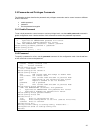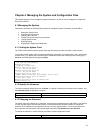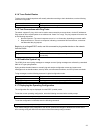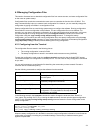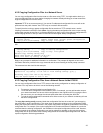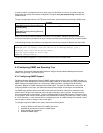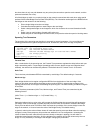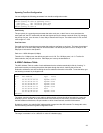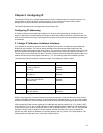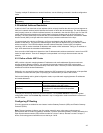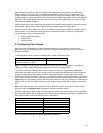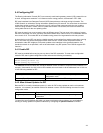
38
but where there is only one path between any two points (the connections span the entire network, and the
paths are branched, like a tree).
All of the bridges (a switch is a complex bridge) on the network communicate with each other using special
packets of data called Bridge Protocol Data Units (BPDUs). The information exchanged in the BPDUs allows
the bridges on the network to do the following:
• Elect a single bridge to be the root bridge
• Calculate the shortest path from each bridge to the root bridge
• Select a designated bridge on each segment, which lies closest to the root and forwards all traffic
to it
• Select a port on each bridge to forward traffic to the root
• Select the ports on each bridge that forward traffic, and place the redundant ports in blocking states
Spanning Tree Parameters
The operation of the spanning tree algorithm is governed by several parameters. You can configure the
following parameters from global configuration mode: forward-time, hello-time, max-age, and priority.
Router(config)# spanning-tree ?
forward-time Set forwarding delay time
hello-time Set interval between HELLOs
max-age Maximum allowed message age of received Hello BPDUs
priority Set bridge priority
<cr>
Router(config)# spanning-tree
Forward Time
After a recalculation of the spanning tree, the Forward Time parameter regulates the delay before each port
begins transmitting traffic. If a port begins forwarding traffic too soon (before a new root bridge has been
selected), the network can be adversely affected. The default value for Forward Time is 15 seconds.
Hello Time
This is the time period between BPDUs transmitted by each bridge. The default setting is 2 seconds.
Maximum Age
Each bridge should receive regular configuration BPDUs from the direction of the root bridge. If the
maximum age timer expires before the bridge receives another BPDU, it assumes that a change in the
topology has occurred, and it begins recalculating the spanning tree. The default setting for Maximum Age is
20 seconds.
Note: The above parameters (Hello Time, Maximum Age, and Forward Time) are constrained by the
following formula:
(Hello Time + 1) <= Maximum Age <= 2 x (Forward Delay – 1)
Priority
Setting the bridge priority to a low value will increase the likelihood that the current bridge will become the
root bridge. If the current bridge is located physically near the center of the network, decrease the Bridge
Priority from its default value of 32768 to make it become the root bridge. If the current bridge is near the
edge of the network, it is best to leave the value of the Bridge Priority at its default setting.
In general, reducing the values of these timers will make the spanning tree react faster when the topology
changes, but may cause temporary loops as the tree stabilizes in its new configuration. Increasing the
values of these timers will make the tree react more slowly to changes in topology, but will make an
unintended reconfiguration less likely. All of the bridges on the network will use the values set by the root
bridge. It is only necessary to reconfigure that bridge if changing the parameters.



